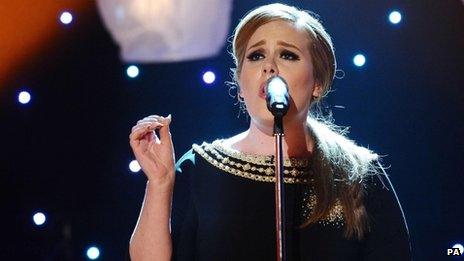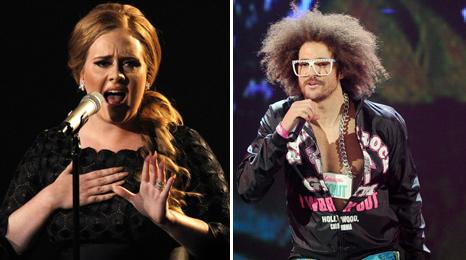Record labels criticise Google over illegal downloads
- Published

Singer Adele is the biggest selling artist in the world in 2011 so far
Google has failed to deliver on promises to tackle illegal file-sharing, according to an organisation which represents music labels around the world.
The IFPI said guarantees Google had made about copyright infringement 12 months ago "remained unfulfilled".
It conceded that the search engine had made "modest steps", but alleged it was profiting from piracy.
In response, Google declined to comment on what it called a "press stunt".
'Piracy' claims
In the report, the IFPI (International Federation of the Phonographic Industry) accused Google of making money from "sites and applications that engage in piracy".
It said, as the world's biggest search engine, it had a "special responsibility" to protect copyrighted music.
It said some work had been done but that more action had to be taken if Google "is not to continue to be abused as a vehicle for piracy."
"Google also needs to do more to ensure that it does not derive revenue from illegal activity and supports the digital marketplace in which it itself is a participant," it added.
Speaking on behalf of record labels around the world, the IFPI has urged Google to take action, including spending money to prioritise search results which direct users to legal music services.
In September 2011 Google's Senior Vice President & General Counsel Kent Walker blogged about the company's commitment to copyright material.
He wrote: "Making high-value content available in authorised forms is a crucial part of the battle against online infringement."
In a statement to the BBC, Google also "pointed to congressional testimony by the company's copyright counsel, Katherine Oyama, external, last month about what it's doing to fight online piracy".
Oyama was attending a hearing on controversial US legislation, which would give the US government the power to request court orders to shut down websites associated with piracy.
The Stop Online Piracy Act (Sopa) has the backing of Hollywood and the music industry, but the founders of Google, Twitter and eBay - amongst others - have criticised the bill.
Appearing before the House Judiciary Committee, Oyama detailed some of Google's current measures to fight piracy, arguing that further legislation was unnecessary.
"The only long-term way to beat piracy online is to offer consumers more compelling legitimate alternative," she said, highlighting how Google created revenue for record labels by selling adverts around their music videos on YouTube.
She added that Google had closed down almost 150,000 accounts from people who attempted to use sponsored search results to advertise counterfeit goods.
Oyama also described Google's speed in removing pirated material from search results and YouTube accounts. She said that, in 75% of cases, the offending links were removed from its pages within six hours of receiving notice from the copyright holder.
'Not Google's job'
Newsbeat asked people what they thought about the issue.
Kim Jarrett, 23, from Essex, said: "I don't think it's Google's job to stop it.

Kim Jarrett thinks Google shouldn't censor its search results
"It's a search engine for people trying to find information and if information is there it's not for them to censor it.
"If record companies have a problem with illegal downloading of music then they should speak to their lawyers and get in touch with the websites themselves."
Annie Lee, 18, from London added: "I do think that Google has some stake and responsibility, but at the same time it's not really their domain - they're just out there as the search engine.
"[But] Google could stop having on their search results all these different download sites - it is pretty straightforward.
"But at the same time people are just going to keep devising new ways to do it."
- Published2 December 2010
- Published9 December 2011

- Published5 December 2011

- Published17 May 2011
